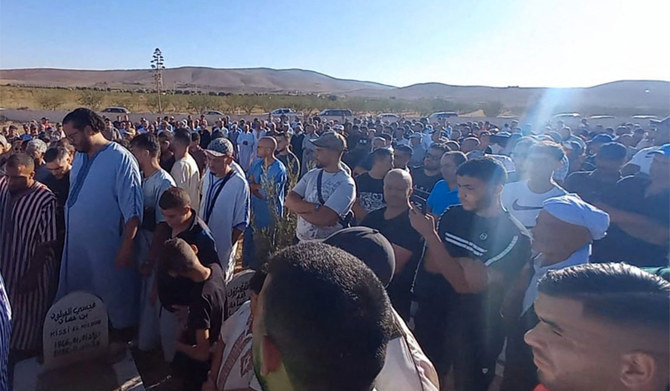CASABLANCA, Morocco: The family of a Moroccan jet skier killed at sea by gunfire blamed on Algeria decried on Tuesday the sluggish repatriation of the body, one month after his death.
Abdelali Mechouar, a Moroccan who resides in France, and his French-Moroccan cousin Bilal Kissi were killed on August 29 allegedly by Algerian coast guards while they were lost on jet skis, according to a survivor.
Kissi’s corpse was found on the Moroccan side of the border.
“We have zero information on the body of our son,” Mechouar’s father Mostafa told AFP on Tuesday. “We want the process to be accelerated so we can grieve.”
The incident comes at a time of increased tensions between the neighboring North African countries which have no diplomatic ties.
Hakim Chergui, the Mechouar family’s French lawyer, said they “have arrived at a blockage,” in which the “military prosecutor’s office has not been responding for a week,” he said, wondering about the “slowness.”
An investigation has been opened by the prosecutor’s office in Oujda, in eastern Morocco near the border with Algeria, and another in France.
Algeria’s defense ministry on September 3 said its security forces had opened fire on the jet skiers “after issuing an audible warning and ordering them to stop several times,” adding that “the suspects refused to comply and fled.”
The defense ministry said that after several warning rounds, “shots were fired, forcing one of the jet skis to stop, and the other two fled.”
In a letter to Algerian President Abdelmadjid Tebboune, seen on Tuesday by AFP, the Mechouar family asked Tebboune to intervene for the restitution of Mechouar’s body as soon as possible.
Mechouar and Kissi were accompanied by Smail Snabe, a French-Moroccan who was wounded and detained in Algeria, according to Kissi’s brother, Mohamed, who was with the group before being rescued by the Moroccan navy.
They all left from the tourist beach of Saidia near the Algerian border, before getting lost at sea and running out of fuel, he said.
Rabat has made no official statement.
Algiers cut off diplomatic relations with Rabat in August 2021, accusing Morocco of “hostile acts” — a decision Rabat called “completely unjustified.”
The dispute over the Western Sahara territory has exacerbated tensions.
Family seeks body of Morocco jet skier killed in Algeria
https://arab.news/cew4b
Family seeks body of Morocco jet skier killed in Algeria

- “We have zero information on the body of our son,” Mechouar’s father Mostafa told AFP on Tuesday
- “We want the process to be accelerated so we can grieve”
Palestinian demolishes his own home in Jerusalem

- Building provided shelter for 4 family members
- Israeli authorities often compel Palestinian residents in Jerusalem to demolish their own homes for allegedly lacking permits
LONDON: A Palestinian in East Jerusalem demolished his home on Sunday after receiving an order from Israeli authorities for building without a permit.
Yasser Maher Daana, a resident of the Jabal Al-Mukaber neighborhood southeast of Jerusalem, was forced to demolish the house in the Salaa area. The building had provided shelter for four family members and covered an area of about 100 sq. meters.
Israeli authorities often compel Palestinian residents in Jerusalem to demolish their own homes for allegedly lacking permits. Those who refuse face demolition of the homes by Israeli bulldozers, and significant fines.
The Israel policy aims to forcibly displace Palestinians and expand Israeli settlements in Jerusalem, in violation of international and humanitarian laws that guarantee the right to housing, according to the WAFA News Agency.
The Israeli government faces charges of war crimes and genocide in the Occupied Territories at the International Criminal Court and the International Court of Justice.














